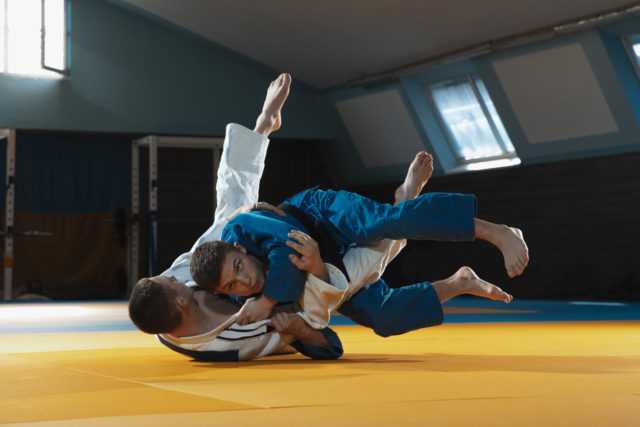
Brazilian jiu-jitsu (BJJ) is a martial art and combat sport that has been steadily growing in popularity in the Philippines. This is, in part, because of the health and fitness benefits that it offers new learners and long-term practitioners alike. It presents plenty of opportunities to engage in intense physical activity, resulting in a variety of benefits. These include a wider range of movement, improved balance and coordination, and enhanced endurance and stamina. In short, BJJ is a great activity for just about anyone who wants to improve their physical health.
Aside from its physical benefits, practicing BJJ can also impact one’s attention and concentration. This makes this combat sport a great fit for people who have attention-deficit/hyperactivity disorder or ADHD. Indeed, joining a BJJ class at Lucas Lepri Philippines can help individuals with ADHD enjoy the following benefits.
Improved Focus and Concentration
Brazilian jiu-jitsu can greatly enhance focus and concentration for individuals with ADHD. The intricate techniques, tactical planning, and the need to anticipate an opponent’s moves demand sustained attention. This focused engagement translates beyond the gym, helping students concentrate better. For example, a person with ADHD who practices BJJ might find it easier to focus on tasks at work or school due to the enhanced attention skills developed on the mat. To ensure that a BJJ class is conducive to improving focus, individuals should look for instructors who emphasize mindfulness techniques and provide structured training sessions.
Physical Activity and Energy Release
The intense physical activity involved in Brazilian jiu-jitsu provides a productive outlet for the surge of excess energy often experienced by individuals with ADHD. Engaging in regular training not only helps channel this energy constructively, but also contributes to better mood management and improved sleep patterns. Indeed, a student who might struggle with restlessness during a regular day may experience mental clarity and physical fatigue after attending a Brazilian jiu jitsu Philippines class. Such feelings can make it easier for them to manage their energy levels.
Access to Structured Routine
For people with ADHD who thrive on routine, BJJ can provide a structured environment that promotes organization and predictability. The consistent format of warm-ups, technique drills, sparring sessions, and cool-downs helps individuals establish a sense of order. In turn, this routine can positively impact their ability to manage time and tasks in other areas of life.
Goal Setting and Achievement
The goal-oriented nature of Brazilian jiu-jitsu can be highly motivating for individuals with ADHD. Progressing through belt ranks, mastering techniques, and achieving personal milestones provide a sense of accomplishment that boosts self-esteem. Through consistent effort and guidance, it’s entirely possible that a student who is struggling in learning new skills will eventually manage to execute BJJ techniques flawlessly. BJJ instructors, such as those employed at Lucas Lepri Philippines, can help their students reach the next level through personalized goal-setting strategies with a clear progression path through different skill levels.
Stress Reduction and Emotional Regulation
Participating in BJJ offers individuals with ADHD an effective way to manage stress and regulate emotions. The physical exertion and mental engagement during training help release endorphins, which can aid in reducing anxiety and improving one’s overall emotional well-being. Consider a student who finds solace in the controlled chaos of a sparring session. They can use this activity to channel and release pent-up emotions.
Social Interaction and Teamwork
A Brazilian jiu-jitsu class presents learners with ADHD with opportunities to foster social interaction and teamwork, empowering them to develop essential social skills. Even the act of engaging with training partners and instructors can help build relationships and foster a sense of belonging within the BJJ community. When a BJJ student with ADHD finds camaraderie and shared goals with their training partners, they can improve communication and cooperative skills.
Problem-Solving and Adaptability
Learning Brazilian jiu-jitsu requires quick thinking and adaptability, skills that can greatly benefit individuals with ADHD. Navigating various techniques and strategies during sparring sessions encourages cognitive flexibility and enhances problem-solving abilities. BJJ students often face situations where they need to adapt their approach during a sparring match. For ADHD patients, this is one way of learning how to think on their feet.
Positive Role Models and Mentorship
Participating in BJJ classes hosted by Lucas Lepri Philippines exposes individuals with ADHD to positive role models and mentorship opportunities. Instructors and senior practitioners often exemplify respect, discipline, and perseverance, making it easier for their students to adopt the same qualities. A student with ADHD might be inspired by an instructor who patiently guides them through challenges, teaching them important life lessons beyond the techniques.
Beyond the gripping holds and calculated moves, Brazilian jiu-jitsu offers individuals with ADHD a profound opportunity to elevate their potential. As they step onto the mat, BJJ learners embark on a journey that cultivates mental discipline, emotional intelligence, and an unwavering spirit. The skills honed through Lucas Lepri Philippines BJJ classes have a unique blend of strategy and camaraderie that ripple into daily life, empowering practitioners to thrive and excel in a world that poses a lot of new challenges.




